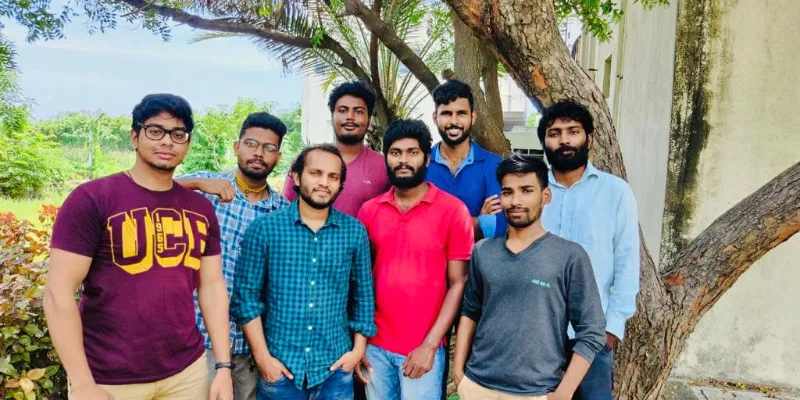How Modulus Housing is solving India’s hospital bed problem amidst COVID-19 pandemic
Modulus Housing has developed a plug-and-play ‘hospital-in-box’ solution, which includes an isolation ward, screening centre, and an intensive care unit, and can be set up in two hours.
The healthcare sector has been fighting the COVID-19 pandemic on the frontlines with every available resource. However, the infrastructure is now failing to keep up with the surge in COVID-19 cases across India, leading to a shortage of hospital beds and healthcare professionals.
Amidst the pandemic, Chennai-based is looking to solve the problem of hospital infrastructure through mediCAB, its instant and portable hospital units.

Credit: Modulus Housing
Speaking to YourStory, Shree Ram Ravichandran, Co-founder and CEO of Modulus Housing, says the hospital unit can be set up by four people in two hours. The plug-and-play “hospital-in-box” solution includes a COVID-19 isolation ward, screening centre, and even an intensive care unit. The best part? It can be set up in two hours.
Founded in 2018 by IIT-Madras alumni Shree Ram Ravichandran and Gobinath P, Modulus Housing aims to build micro infrastructures. The IIT-M-incubated startup provides foldable cabin houses to address infrastructure issues related to disaster relief, refugee housing, defence, events management, medical and educational camps, hotels and MSME shops etc. It also addresses the housing issue for labourers working at construction sites, oil refineries, and mines.
“In January, we joined hands with an NGO, Selco Foundation, and decided to construct a micro-hospital for rural areas. The product was mainly a pregnancy ward to address the problem of deliveries in unhygienic or open spaces in rural regions. We were working on this product when COVID-19 hit, and construction labourers had to return to their native lands. But, we were already working on the healthcare project and pivoted to focus on making portable hospital units to address the pandemic,” Shree Ram says.

mediCAB. Credit: Modulus Housing
Portable hospital units for COVID-19
Modulus Housing partnered with Sree Chitra Tirunal Institute for Medical Sciences and Technology (SCTIMST), Thiruvananthapuram, and launched mediCAB. “They helped with the medical design and clinical inputs for the product while we engineered it,” Shree Ram says.
The CEO adds that the startup has already deployed its first unit earlier this month in Wayanad district in Kerala and has begun its pilot. The deployment in Kerala was done using grant funds from US-based NGO Habitat for Humanity.
According to the co-founder, the portable micro-hospital unit can be customised. It can be developed to include four zones: a cabin for healthcare workers; a chamber for patient screening; isolation wards; and intensive care unit(s).
Each isolation ward can be equipped with two beds for COVID-19 patients. Zones can be added to the micro-hospital structures depending on the requirement, space, and budget. The unit comes with in-built electricals, which are plug-and-play and can be immediately powered. The unit will also need to be connected with a water source.
Shree Ram says the startup can currently ship components across India in one week and set up the hospital units within two hours.

Credit: Modulus Housing
In the beginning
Shree Ram says that the idea for the startup came to the duo in 2015 while they were second-year engineering students. In the same year, Chennai saw devastating floods that claimed hundreds of lives and washed away shelters of lakhs of people.
In 2016, the co-founders came up with the idea of foldable housing to help provide solutions to people displaced due to natural disasters and started working on the prototype as an academic project. The duo won the Azim Premji social enterprise idea challenge held by Azim Premji University. They established the startup in 2018 and launched its flagship product in 2019.
Currently, the startup provides portable housing solutions for disaster relief, refugee housing, defence, events management, and medical and educational camps among others.

Credit: Modulus Housing
Business model
The co-founder says state governments, institutes, NGOs, and hospitals can be potential buyers for mediCAB. He says the pricing of the unit completely depends on the size of the unit, design, and requirement. Setting up the pilot project in Kerala cost Rs 1,800-1,900 per square feet.
Shree Ram says the startup has received CSR funding from a US-based bank for developing a 100-bed facility. While he did not disclose financial details, the CEO says the startup will start working on the project from the first week of August.
The startup is also in talks with other state governments for the deployment of mediCAB.
The CEO also said the launch and adoption of mediCAB has also opened up other business opportunities.
“We received more than 50 requests in three days for setting up farmhouses in rural areas where people have land but any form of construction is difficult. Apart from this, we have also joined hands with the Meghalaya government to set up micro-factories. As labourers returned home due to COVID-19, the state government is looking to develop micro-factories to employ labourers for processing spices and making pickles, and creating job opportunities,” he adds.
(Edited by Teja Lele Desai)











